|
|
本帖最后由 woikuraki 于 2012-3-31 15:05 编辑
【中文标题】中国不情愿地揭开基督的面纱 - 北京和宗教
【原文标题】China's 'Come to Jesus' Moment How Beijing got religion
【登载媒体】外交政策
【原文作者】ERIC FISH
【原文链接】http://www.foreignpolicy.com/articles/2012/02/15/china_christian_awakening
对外宣称无神论的中国通常不会与基督教打交道,但这个国家迅速发展起来的基督教团体,正在成为中国社会的重要组成部分。去年,中国政府估计基督教堂信众有2500万人,但一些独立机构估算经常参与基督教活动的人有6000万到1.3亿。曾经在中国一度被禁止的宗教,现在似乎得到了勉强的接纳。甚至在某些官方小团体内部,有人认为基督教或许会带来目前纷乱不堪的中国所需要的某种平和的状态。
过去几十年来,地下“家庭教堂”的存在,和它们所隐含的反叛潜在因素,让政府坚决反对宗教活动。但是在最近,共产党已经开始考虑,如此大量的皈依信众能否让自己有所收益。一些传统的基督教价值观,包括强大的工作伦理和与人为善的重要性,都让掌权者认为宗教是一个颇有吸引力的工具。
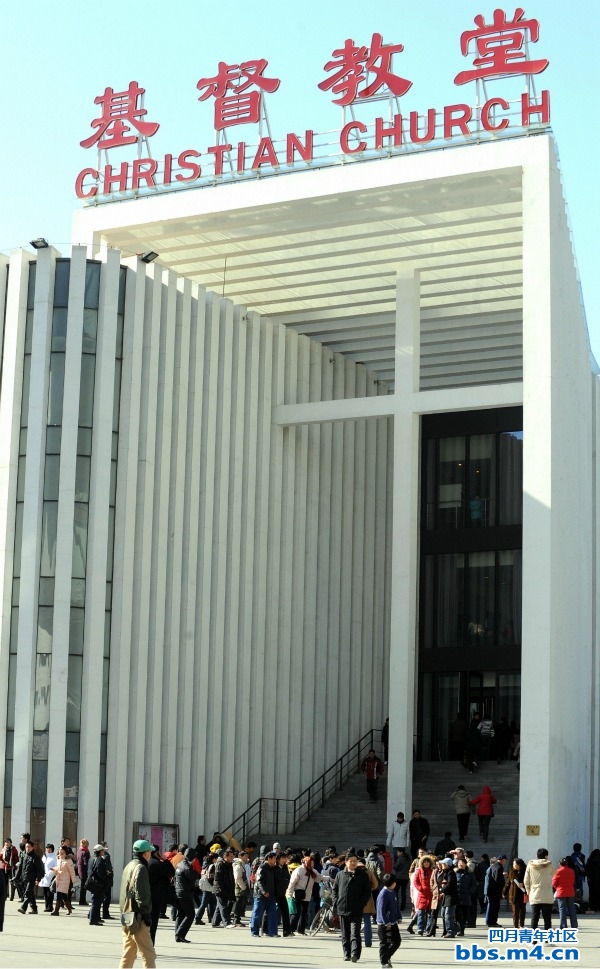
人们聚集在海淀基督教堂外。2009年2月22日,美国国务卿希拉里•克林顿在访问中国期间,在此逗留了几个小时。
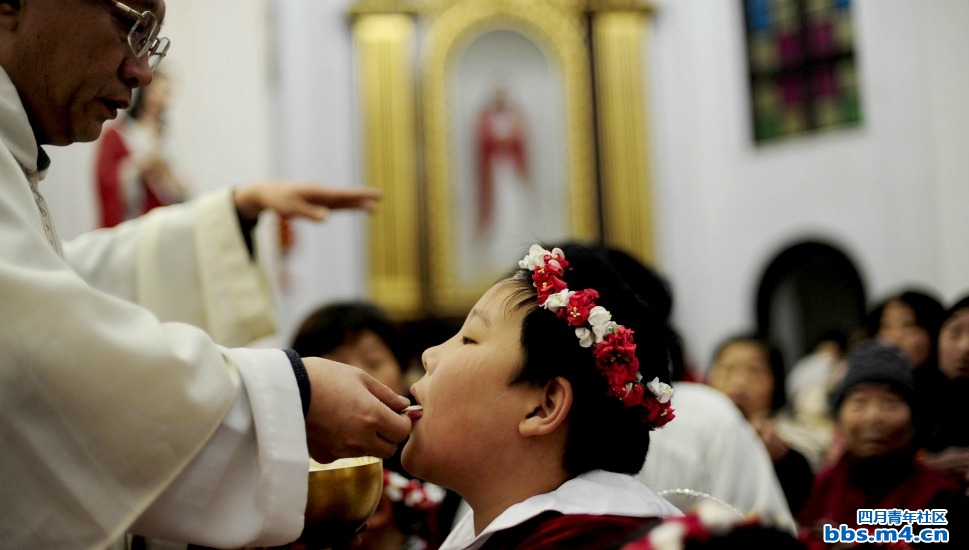
2010年,中国中部省份湖北省武汉市的一座天主教堂中,中国朝拜者在圣诞节前夜聚会中接受神父的圣餐。那一年,罗马教皇本笃十六世在圣诞节讲话中,批评中国限制宗教和信仰自由,表露出梵蒂冈与北京的紧张关系。中国在1951年断绝了与基督教圣座的联系,政府运作的中国天主教爱国会在管理中国的天主教活动。

2009年12月24日,一个中国女孩穿着圣诞老人的服装站在北京一家教堂的门口。她身后的牌子上写着教堂的名字“北京市天主教爱国会”,表明这是一个正式注册的教堂。中国官方只认可5个宗教:新教、基督天主教、伊斯兰教、佛教和道教。
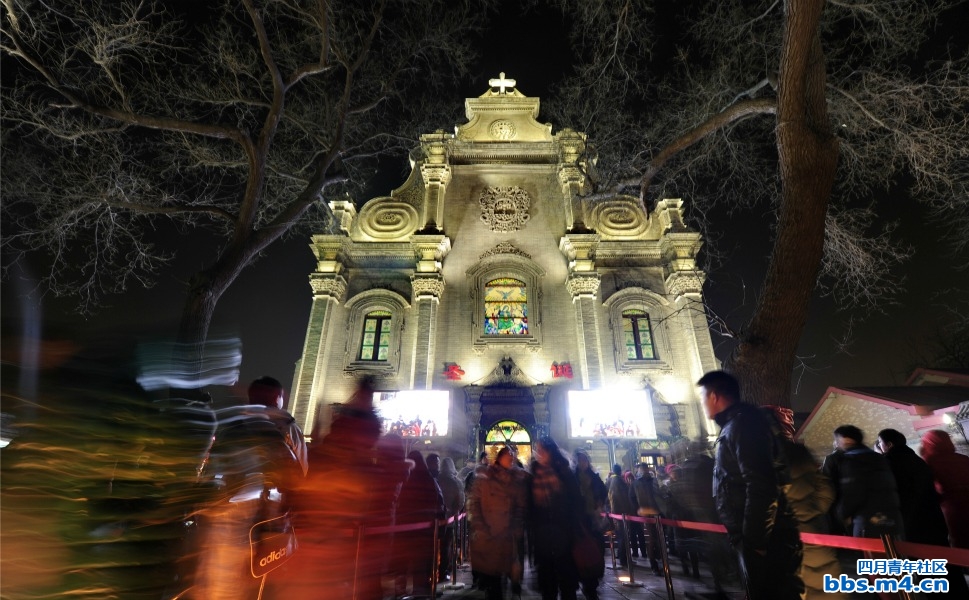
2010年圣诞节前夜,中国朝拜者走进北京一家天主教堂。圣座出于对毛泽东的共产主义政府的愤怒而承认台湾是中国唯一合法政府,梵蒂冈与中国的外交关系自此断绝。今天,梵蒂冈是欧洲唯一一个,也是全世界23个与台湾建立外交关系的国家之一,其它国家包括冈比亚、图瓦卢和海地。
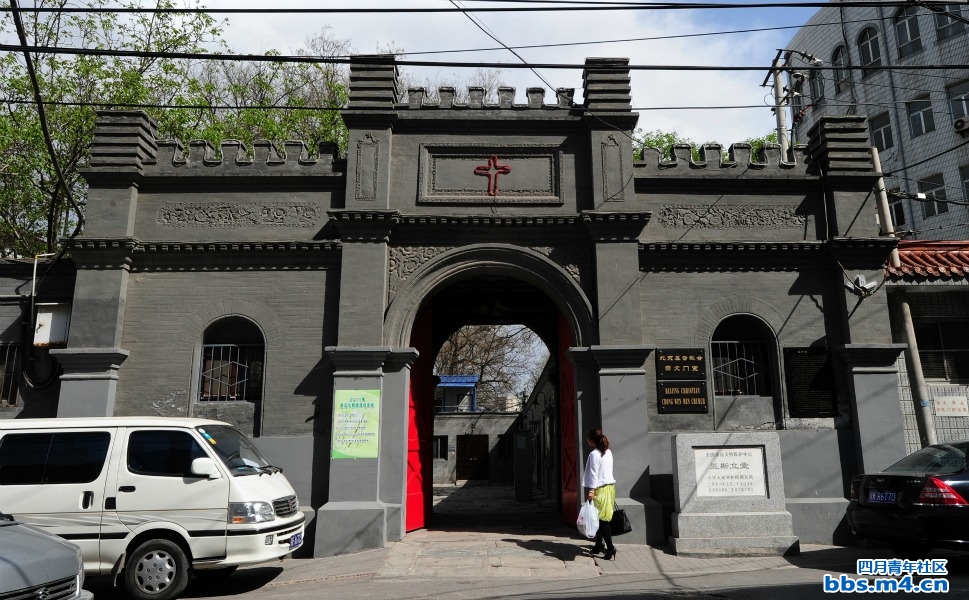
2011年4月17日,一个女人走进北京一家基督教堂。尽管无数信徒在没有正式注册的“地下教堂”和“家庭教堂”中做礼拜,但官方数据显示正式教堂中大约接待 1500万名新教徒和500万名天主教徒。19世纪70年代由美国卫理公会教徒修建的北京崇文门天主教堂,是北京最大的新教教堂之一。
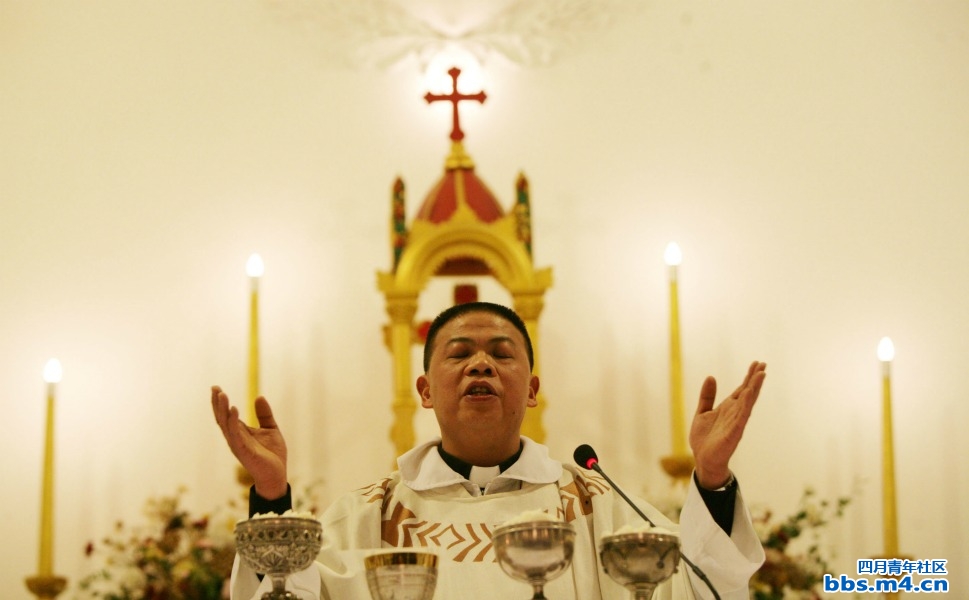
2008年,一位牧师在重庆的圣约瑟夫天主教徒主持圣诞节前夜聚会。圣诞节在中国不是公共假日。
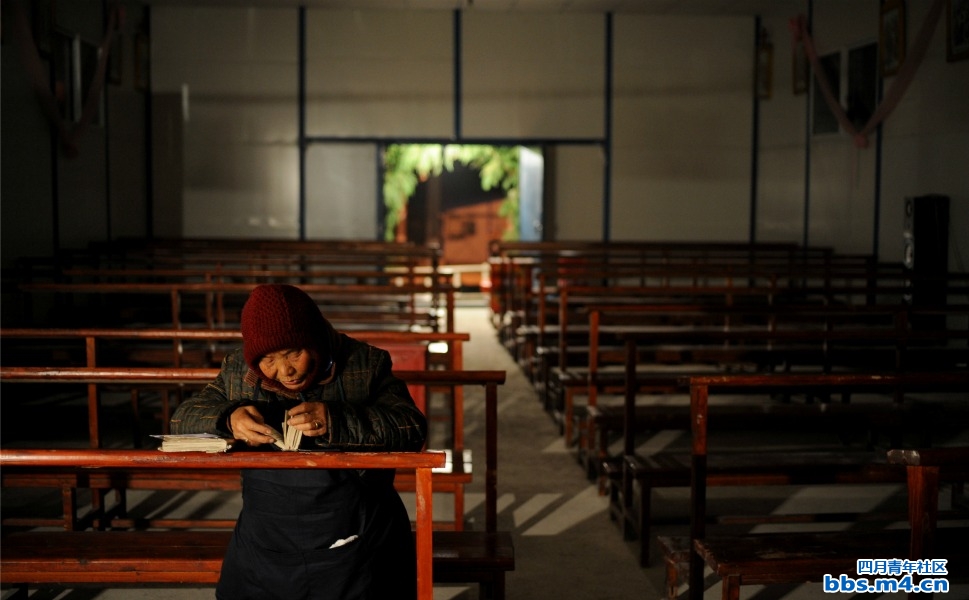
2008年圣诞节之后,一位天主教徒在四川省彭州白鹿临时搭建的教堂中阅读圣经。这座教堂在2008年5月12日毁于地震,目前被安置在活动房屋中。
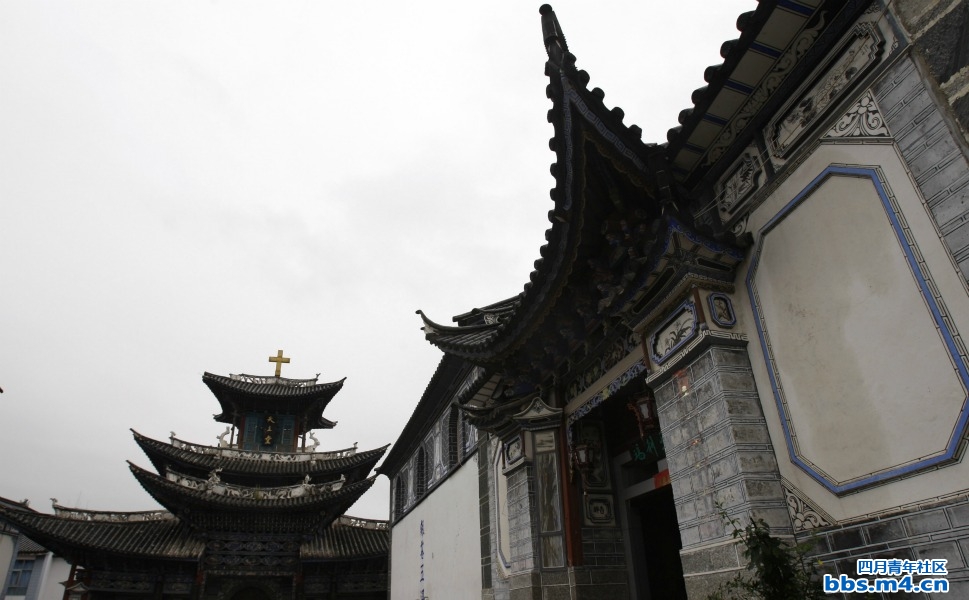
云南老城大理,一座1927年由法国牧师修建的教堂。大理城建于明代洪武年间(1368年-1398年),是中国最著名的旅游地之一。
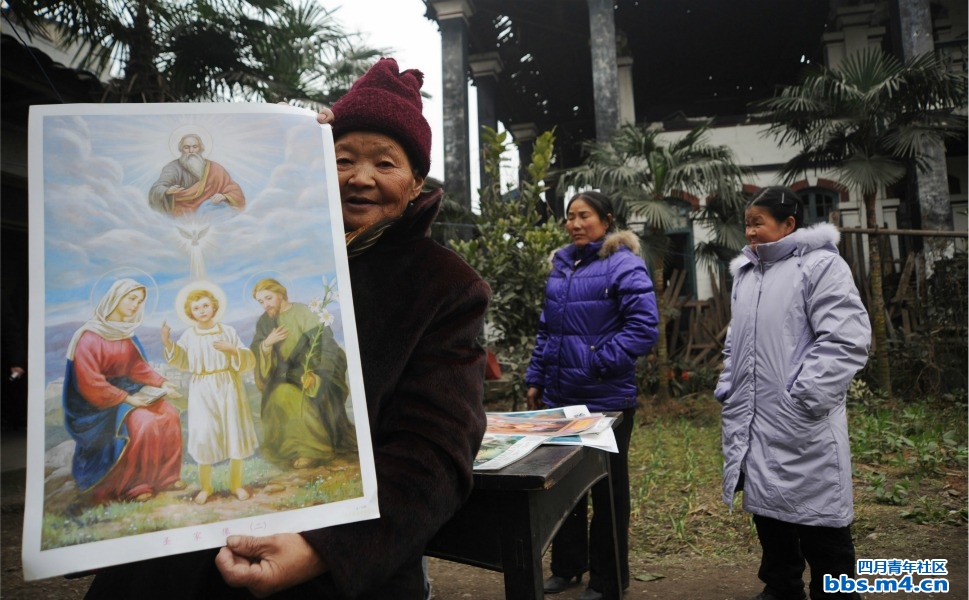
2008年圣诞节聚会前,四川省秀水镇一位天主教徒展示一张耶稣的图片。
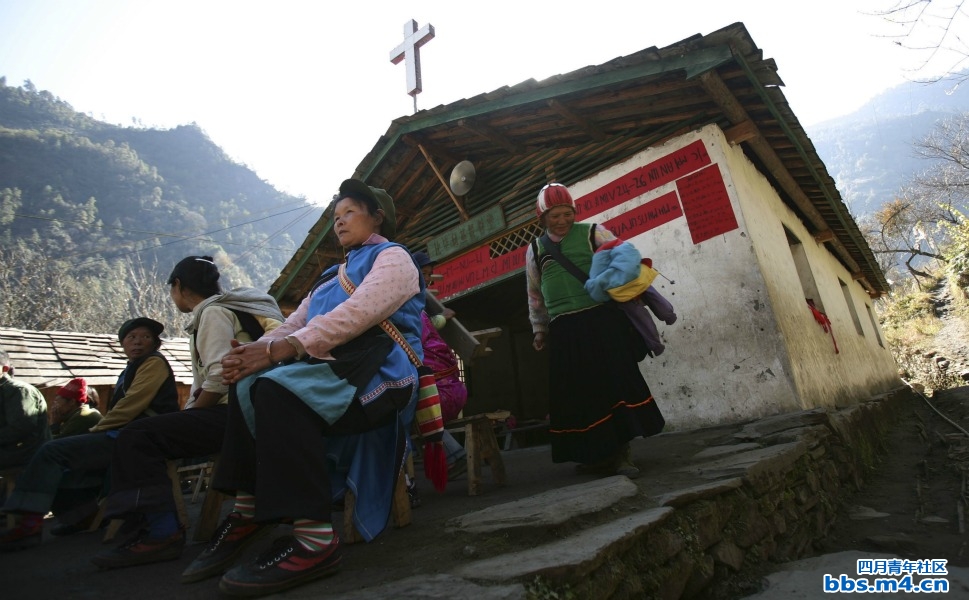
2007年12月25日,云南省贡山县毕毕里村的村民在观看圣诞节表演。毕毕里是一个多民族聚居的村庄,包括怒族、独龙族、傈僳族和藏族,村民大多信仰基督教。
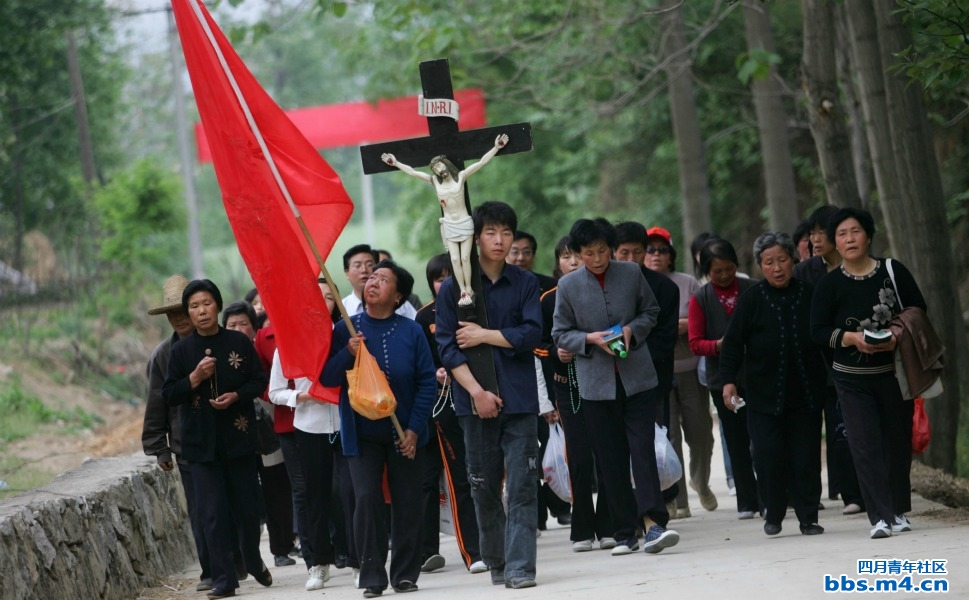
2007年5月2日,陕西省跑窝村天主教徒走向模拟的基督受难地——十字山。当地的天主教圣地由传教士刘嘉录建造,教皇庇护六世批准命名此地为十字山。
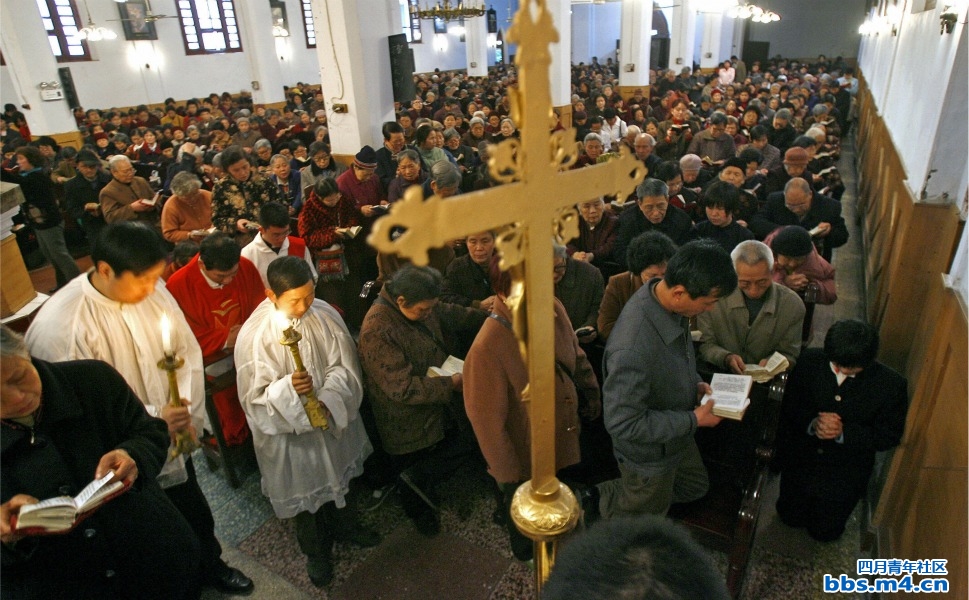
2007年4月6日,信众在中国西部大城市重庆的圣约瑟夫大教堂的聚会中,祈祷复活节之前的耶稣受难节。
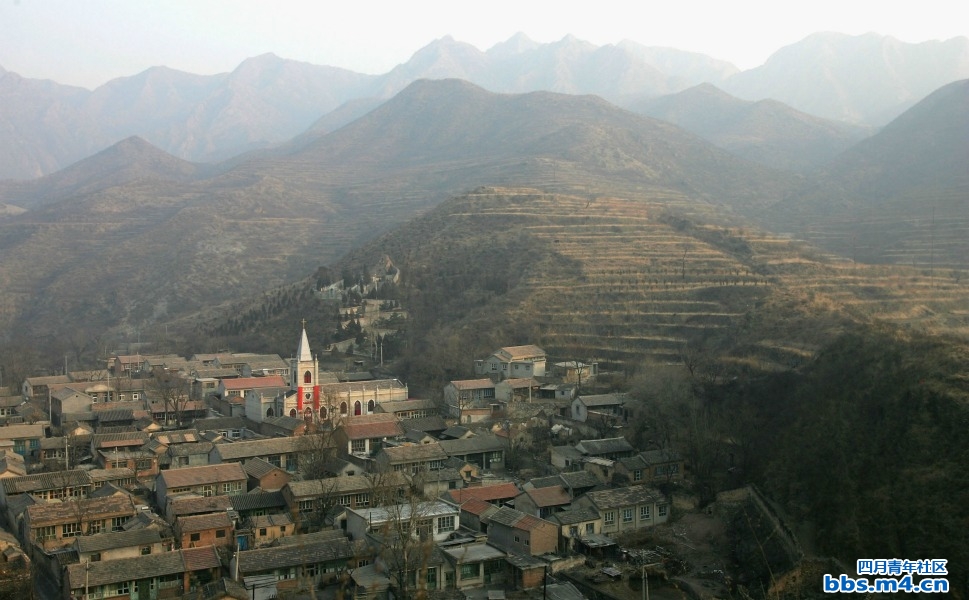
2006年,北京郊区后桑峪村的经过政府批准的教堂,坐落在民房中。
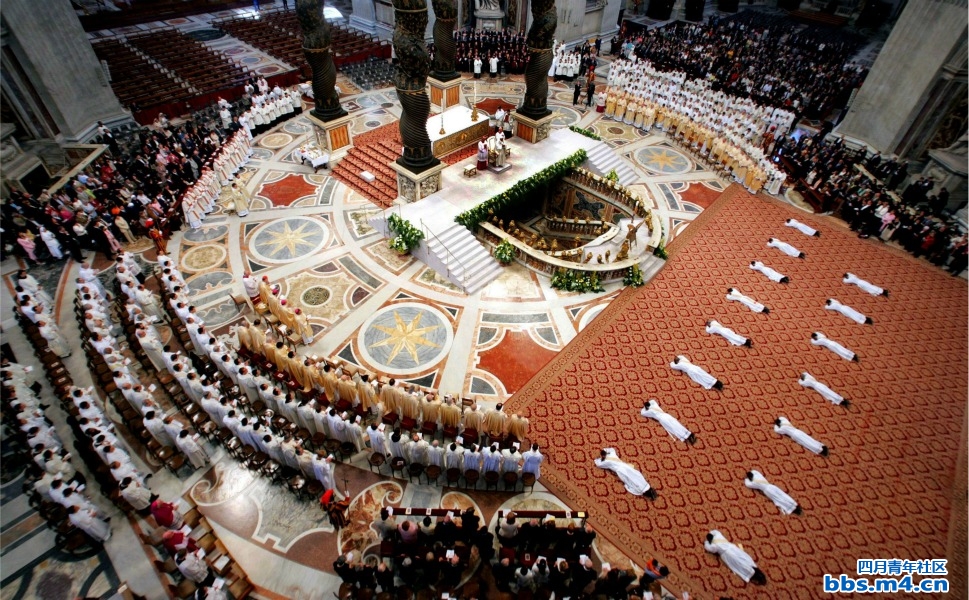
2006年5月7日,执事们在圣彼得大厅里举办的新牧师授职仪式上,在教皇本笃十六世前伏地。中国国家天主教堂定期委任主教而不听教皇指令,导致2001年教皇将一名主教逐出教会。
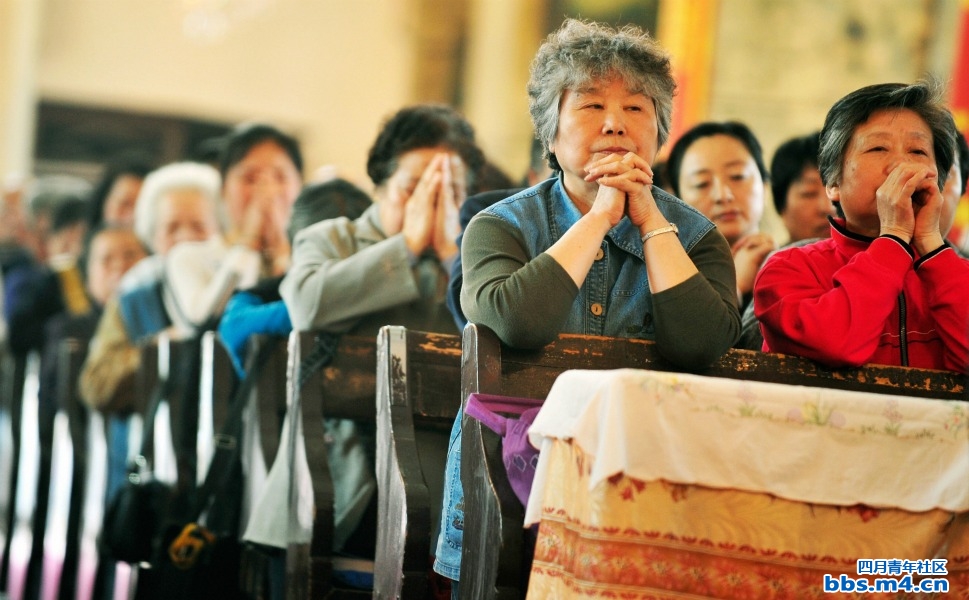
2008年4月30日,中国天主教徒在北京一座官方教堂中,举办特别的祈祷仪式,纪念距2008年北京奥运会开幕100天。
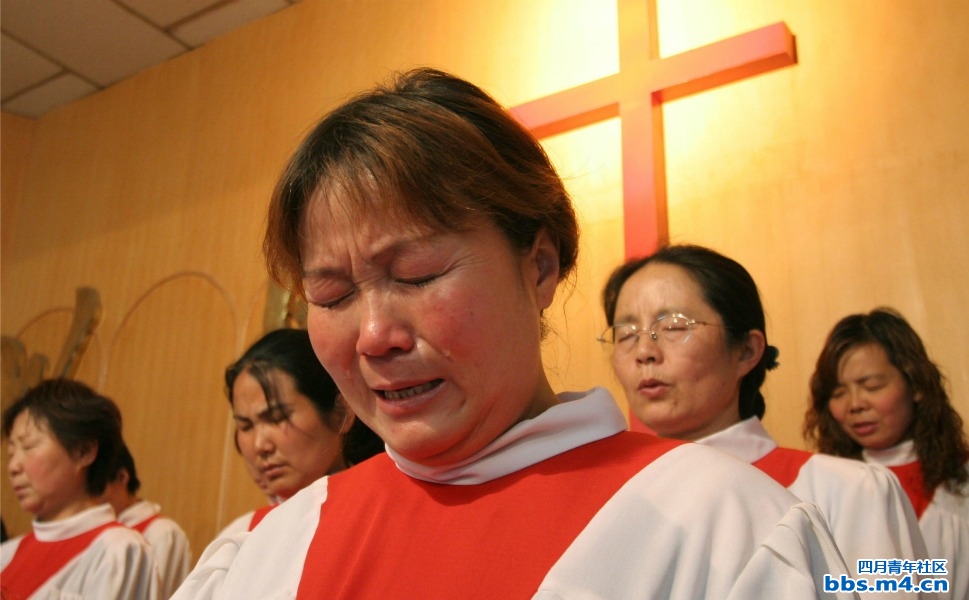
2005年7月3日,唱诗班成员在青海省西宁市一座教堂举办的圣餐礼中祈祷。
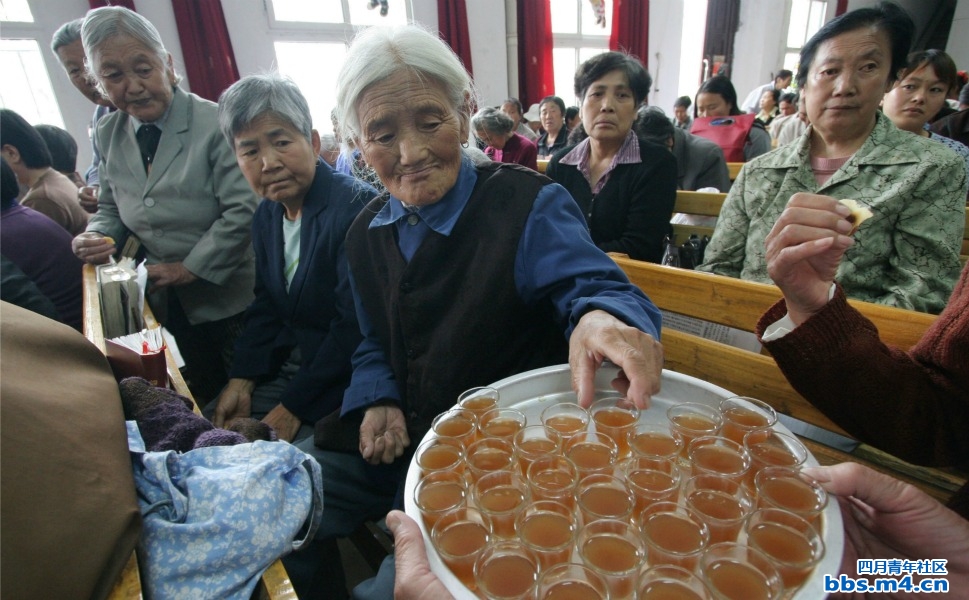
2005年7月3日,青海省西宁市的信徒出席圣餐礼。
去年春天,由11名中国政府官员组成的代表团访问了肯尼亚奈落比,他们的任务是了解如何在中国发展基督教。国家宗教事务局局长王作安对肯尼亚圣公会大主教说:“宗教有益于国家发展。”
在当今社会关系日趋紧张和扑朔迷离的经济前景下,对外宣称无神论的中国共产党内部似乎出现了一些对基督教的缓和情绪。政府出让土地、修建教堂,还进行基督教对社会正面促进作用的研究。然而直到最近,宗教一直被认为是一股有害而又难以阻止的力量。2001年,中国主席江泽民呼吁小心处理宗教事务,实际中采取了各种手段压制宗教活动,并推崇社会主义无神论和物质文化。
共产党对于宗教的厌恶传统来自卡尔•马克思的理论,他认为这是资本主义独裁者“麻醉受压迫者痛楚”的“精神鸦片”。在一个平等化的社会主义社会中,人们不需要这种剥削残余。
但是,近期一些针对宗教的举措似乎表明,这种意识形态上的厌恶随着中国的社会经济现状发生了变化。自从邓小平在1978年开启了中国经济的大门之后,GDP增长了40倍,当然还伴随有严重的副作用。腐败、贫富差距、环境恶化和金融危机都在挑战共产党的执政能力。宗教鸦片或许正是医生会开给紧张的共产党的处方药。
一些学术机构和智囊团得到了政府资助来研究宗教的政治和社会作用,课题涉及基督教在美国和欧洲发展中所扮演的角色。在中国学术界,类似上海复旦大学的宗教研究专业和北京师范大学人文宗教专业变得越来越普遍。
威斯敏斯特大学研究中国宗教和政治的Gerda Wielander说:“政府的计划和基督教的章程有很多重叠之处。当你与中国基督教徒对话或者看看历史数据的时候,他们都在强调自己是好公民,或者迫切希望变成好公民。因此,政府有足够的理由涉足宗教。”
去年10月在南部城市佛山,一辆货车碾过一名2岁女童,司机迟疑了一下,用后轮再次碾压女童。事件的视频在网络上疯狂流传,引起人们对中国社会广泛讨论的是,在视频中有18个人走过事故现场,没有一个人停下来关注濒死的孩子。最后是一个拾荒者伸出了援手。肇事司机后来说,他觉得压死一个人要比压伤一个人赔偿的钱少。
在很多中国人看来,这起事件揭示了某些后社会主义社会中存在的问题,是抛弃道德,盲目追求物质财富的后果。普渡大学教授、《中国的宗教:在共产党统治下生存和复兴》一书的作者Fenggang Yang说:“旧的价值体系已经不再起作用了,而新价值观尚未树立,所以很多人都感到失落,不知道该怎么办。”
21岁的南京大学生朱振感到漂泊无依,直到在基督教会中寻找到慰籍。他说:“大约30年前,我们开始‘改革开放’,周围的一切都变了,但是我们不知道如何接受这些新事物。”
4个月之前,他开始到校园里非正式的基督教俱乐部去学习圣经。他说:“我只是想寻找某种信仰,我害怕自己将来会做错事情而后悔莫及。所以我到教堂里唱歌、讲故事,我的内心开始变得平静了。”
据估算,大约有1万中国人每天都在祈祷。1949年中国的新教教徒只有100万人,今天官方统计的中国基督教徒有2100万,民间预测有1.3亿。在未来30年,这个数字会上升到4亿,相当于全世界基督教徒的20%。我们很难了解到准确的中国基督教徒数量,因为很多人在非法的家庭教堂里秘密做礼拜,官方数字无法包括这些人。
这些地下教堂吸引了很多基督教徒,因为他们可以在政府的监控之外布道。这让共产党感到不舒服,因此开始频繁压制民间教堂,担心其内部会酝酿出政治野心。一家著名家庭教堂的组织者最近被关入劳改营6个月,拥有1000名福音教派信众的北京守望堂因拒绝解散而经常遭到驱逐。
如果你造了它……
在朱念书的城市南京,政府出资修建了一个官方批准的、能容纳5000人的新派教堂,是中国最大的教堂之一。美国的基督教组织国际合作事工组织,在得到政府的允许后,近年来帮助中国建造了292座教堂。当然部分原因是希望让地下教堂的信众走向公开,但也可以理解为,基督教对中国的经济发展是有好处的。
Wielander说:“从官方角度看来,基督教是有用的工具,因为它不但教导人们与人为善、做安份良民,还涉及到工作伦理。”他还说,在西方资本主义发展的初级阶段,新教帮助遏制了市场经济中的贪婪和腐败等欲望,这也是颇具吸引力的因素。
有些人认为“新教工作伦理”已经在中国产生了类似的作用。温州的商业聚集区有20%到30%的人口信奉基督教,当地政府已经开始研究基督教企业的成功之处。
《构建中国的耶路撒冷:当代温州的基督教徒、权力和使命》一书的作者曹南来说:“传统的基督教道德观或许间接帮助了温州的成功,因为它能够保持家庭的稳定,从而在道德流失的大环境下维持家族企业的稳定。家庭毕竟是温州人从事资本主义生产活动的最小单位。”温州一位基督教工厂经理在2010年接受BBC采访时说,他更喜欢聘请信奉基督教的工人,“因为他们做错事情的时候会感到内疚,这就是区别。”
过去几个月里,温州的经济增长开始放缓,社会上出现了严重的信用危机。影子贷方拼命调用民间贷款,有些生意人逃离温州,甚至自杀来躲避债务。然而,城市中的基督教徒日子似乎并不那么难过,主要原因是他们经常在教堂中举办活动而建立起的信任感。曹说:“在布道时,传教人谈到基督的爱,告诉众人不要期望从教众那里得到全额的还款,因为我们都是上帝庇佑下的兄弟姐妹。用宗教语言来阐述债务危机让人们联想到上帝对人类贪婪的惩罚,温州的基督教徒因此不会对借方施加太大的压力。”
国际上的研究表明,这种情绪有其存在的价值。《宗教心理》去年国际版上有一篇文章,题目是“刻薄的上帝造就良善的人类:有关上帝阻止作弊行为的另类观点”。其中提到,在一项可以轻松作弊的数学测试中,信仰善恶循环的上帝的人表现得比其他人更加诚实。
尽管道德和经济发展的诱惑力是促使中国对宗教重新产生兴趣的重要原因,但一股潜在的动机也在发挥作用——政治控制。2006年,路透社在采访中国顶级政治顾问机构的高层官员李君如时问道,为什么印度可以维持一个民主化的国家,而中国不能。他回答说,因为印度可以靠宗教来控制人民。
去年12月,当乌坎居民把所有官员都驱逐出这个小渔村的时候,他们吸引了全国人来关注腐败官员攫取农民土地,获取收入和开发商的回扣的现象。中国所表现出来的症状与马克思描述的很多资本主义制度非常相像。
马克思的理论认为,封建社会在进入社会主义社会之前,会先到达资本主义社会的阶段。毛泽东掌权之后,试图越过资本主义阶段,因此开展了“大跃进”这项社会经济活动,这场活动导致4000万人死亡。
但是,毛的继承人邓在1978年的改革开放中,策略地承认中国需要首先接纳资本主义经济制度,而不用理会其它资本主义教条。尽管邓在实际中结束了对宗教信仰的禁令,并且允许人们在被严格监控的教堂中从事宗教活动,但他依然通过学校等官方渠道宣扬无神论。在官方言论中,宗教是“封建迷信”——强烈不赞同,但勉强可以接受。
然而现在,党内一些自由倾向的马克思主义者看到,宗教是抚慰民众对分配不公的愤怒情绪的一个有效工具。北京大学中国哲学、历史和宗教教授彭国翔说:“总体来看,利用和控制宗教在中国历史上不是新鲜之举。在经典的马克思理论中,宗教只不过是精神鸦片。但是近来,当局极有可能开始重新考虑宗教的作用,并探索如何有效地利用它,而不是单纯地禁止和根除宗教的发展。”
其他人支持基督教的发展是基于其一己之利。曹说,宗教管理部门和基层政府阻止通常希望更多的基督教徒在自己辖区内注册,这样可以扩大其权力基础,获得更多房屋租金收入。中国国家宗教事务局拒绝对此给予回应。
也必须承认,党内还有一些人坚决反对宗教。去年12月,一位高层官员强调禁止党员有宗教信仰的问题,说:“国内外敌对势力在想尽一切办法,利用宗教在少数民族聚居地区从事分裂主义活动。”
宗教组织的团体力量是主要因素,尤其是其内部会培养出对教皇和达赖喇嘛的效忠思想。1989年,天主教堂在波兰共产主义垮台过程中起到的作用让人们心怀担忧,同样还有轮子事件——1999年北京发生的大规模行走,最终导致政府的残酷镇压。即使新教也和西方帝国主义,以及19世纪和20世纪初心怀不轨的传教士拉上了关系。
Wielander说:“针对基督教的确存在矛盾的观点。佛教和道教都相对脱离世俗,它们都在教导信众如何脱离喧嚣,如何躲避这个可怕的世界,而基督教更加主动。只要政府想办法把宗教的力量转化为政府的行动计划,那么也不失为一件好事。”
这的确就是党的计划。一位来自江苏省新皈依的20岁信徒说,她定期到一家非法家庭教堂做礼拜,那里已经有150名信徒。当局知道这个教堂,但不加干涉。她不认为基督教信仰与共产党章程有冲突。
她说:“圣经告诉我们,要遵从政府的规定。”
原文:
Officially atheist China is not often associated with Christianity, but the country's rapidly growing Christian community is becoming an increasingly vocal part of Chinese society. Last year, the Chinese government estimated church membership at 25 million, but independent estimates peg adherents at between 60 million and 130 million. Once banned, the religion is now receiving grudging acceptance, and in some official circles, there is even a belief that Christianity might bring the pacification that an unsettled China needs.
For decades, the existence of underground "house churches" and the potential for rebellion set the government against the religious movement. But more recently, as Eric Fish reports for Foreign Policy, the Communist Party has begun to consider how it might benefit from the growing legions of converts. Some traditional Christian values, including a strong work ethic and the importance of being a good citizen, make the religion an appealing ally to those in power.
Above, a crowd gathers outside the Haidian Christian Church after the arrival of U.S. Secretary of State Hillary Clinton on Feb. 22, 2009. Clinton spent the last few hours of her 2009 China trip at this Beijing church.
Chinese worshippers receive the Eucharist from a priest as they attend Christmas Eve mass in 2010 at a Catholic church in Wuhan, in central China's Hubei province. Pope Benedict XVI criticized China for its curbs on religion and freedom of conscience in his Christmas message that year, reflecting the tense relations between the Vatican and Beijing. China cut ties with the Holy See in 1951, and the government-run Chinese Catholic Patriotic Association oversees Catholic churches in China.
A Chinese woman dressed in a Santa costume stands at the entrance to a church in Beijing on Dec. 24, 2009. The signs behind her say the church's name and "Beijing City Catholic Patriotic Association," identifying it as an officially registered, or government, church. China officially sanctions five religions: Protestant and Catholic Christianity, Islam, Buddhism, and Taoism.
Chinese worshippers walk in front of a Catholic church after the Christmas Eve mass in 2010 in Beijing. The Vatican and China broke formal diplomatic ties after the Holy See angered Mao Zedong's communist government by recognizing Taiwan as the legitimate government of China. Today, the Vatican is the only European state and one of only 23 sovereign states globally that maintain diplomatic relations with Taiwan; others include Gambia, Tuvalu, and Haiti.
A woman walks to a Christian church on April 17, 2011, in Beijing. While tens of millions of believers are thought to pray at "underground" or "house" churches, which aren't officially registered, about 15 million Protestants and 5 million Catholics worship in officially sanctioned churches, according to recent official data. The Beijing Christian Chongwenmen Church, established in the 1870s by American Methodists, is one of the largest Protestant churches in Beijing.
A priest hosts a Christmas Eve mass at the St. Joseph's Cathedral in 2008 in Chongqing. Christmas is not a public holiday in China.
A Catholic reads the Bible after a Christmas Eve mass in 2008 at the temporary Bailu Township Church in Pengzhou, Sichuan province. The church, destroyed in the May 12, 2008, Sichuan earthquake, was rebuilt in a makeshift house.
A church built in 1927 by a French priest stands in the old town of Dali, in Yunnan province. Built during Ming Dynasty Emperor Hongwu's reign (1368-1398), Dali is one of Yunnan's most popular tourist destinations.
A Catholic displays a picture of Jesus before a Christmas Day mass in 2008 at the Church of Xiushui Township in Sichuan province.
Villagers watch a performance during Christmas celebrations at Bibili village on Dec. 25, 2007, in Gongshan County, Yunnan province. Bibili is a multiethnic area where many villagers -- including the Nu, Lisu, Dulong, and Tibetan ethnic minority groups -- practice Christianity.
Catholics walk to the simulated crucifixion site of Jesus at Cross Hill in Paowo village, Shaanxi province, on May 2, 2007. Cross Hill is a Catholic holy place built by missionary Liu Jialu as a simulation of Calvary. Pope Pius VI approved naming the place Cross Hill.
Worshippers pray during a mass to celebrate Good Friday ahead of Easter at St. Joseph's Cathedral in China's southwestern municipality of Chongqing on April 6, 2007.
The state-sanctioned Shangyu Church stands among the buildings of Shangyu village on Beijing's outskirts in this 2006 photo.
Deacons lay down in front of Pope Benedict XVI during the ordination ceremony of new priests at St. Peter's Basilica on May 7, 2006, in the Vatican City. China's state Catholic Church periodically ordains bishops without papal authority, spurring the papal excommunication of one such bishop in 2011.
Chinese Catholics attend a special prayer to mark 100 days until the start of the 2008 Beijing Olympics at a government-approved Catholic church in Beijing on April 30, 2008.
Choir singers pray during a communion service at a church on July 3, 2005, in Xining, Qinghai province, in northwest China.
Worshippers attend a communion service at a church on July 3, 2005, in Xining, Qinghai province.
BEIJING – Last spring, a delegation of 11 Chinese government officials visited Nairobi, Kenya. Their mission: to seek advice on how to promote Christianity in China. Wang Zuoan, director of the State Administration for Religious Affairs, which regulates religion in China, reportedly told Kenya's Anglican archbishop that "religion is good for development."
Amid growing social tension and an ominous economic outlook, some quarters of the officially atheist Chinese Communist Party seem to be warming to Christianity. Land is being donated, churches built, and research being conducted on positive Christian contributions -- all by the Chinese government, which until recently treated religion as a harmful but unstoppable force. In 2001, Chinese President Jiang Zemin called for religion to be cautiously accommodated, but actively discouraged, and adapted to the socialist culture of atheism and materialism.
The traditional antipathy toward religion in the Communist Party stems from Karl Marx's idea that it is the "opiate of the masses" that "dulls the pain of oppression" from capitalist aristocrats. In an egalitarian socialist society, there's no need for this remnant of exploitation.
But recent moves toward religion suggest this ideological aversion is transforming along with China's socioeconomic situation -- albeit more slowly. Since Deng Xiaoping began opening China's economy in 1978, its GDP has grown 40-fold with increasingly serious side effects. Corruption, yawning wealth inequality, environmental degradation, and the threat of a major banking crisis weigh on the Communist Party's ability to maintain control. The religious opiate could be just what the doctor ordered for a nervous Communist Party.
Academic studies and think tanks devoted to studying religion's political and sociological effects have been sponsored by government organs to explore topics such as Christianity's role in developing the United States and Europe. And institutions like Fudan University's Religious Studies Department in Shanghai and the Institute for Advanced Study of the Humanities and Religion at Beijing Normal University are becoming more common in Chinese academia.
"There's a fair amount of overlap between the government agenda and the Christian agenda," says Gerda Wielander, who researches Chinese religion and politics at the University of Westminster. "When you speak to [Chinese Christians] or look at the data, they all emphasize what good citizens they are and what good citizens they want to be, so there's a lot for the government to tap into there."
Last October, in the southern city of Foshan, a van ran over a 2-year-old girl. After pausing, the driver continued to drive over her again with the back tire. The video of the incident, which went viral and incited debate on the state of Chinese society, showed 18 bystanders walking past and ignoring the fallen girl until a scrap peddler eventually came to her aid. The driver later reportedly said he'd be liable for less money with a dead girl than an injured one.
For many Chinese, the incident highlighted some of the problems that have emerged from the post-socialist jettison of morality in the pursuit of material wealth. "The old moral system doesn't work anymore, and the new one hasn't been established," says Fenggang Yang, a professor at Purdue University and author of Religion in China: Survival and Revival under Communist Rule. "Many people in society feel kind of lost and don't know what to do."
Twenty-one-year-old Nanjing college student Chu Zhen felt adrift before finding solace in Christianity. "About 30 years ago we had 'Reform and Opening Up,' and almost everything changed," he said. "But we don't know how to accept it."
Four months ago he started going to informal Christian clubs and Bible studies on his campus. "At that time I just wanted to find a belief," he says. "I feared in the future I might do something really bad that I can't undo. So I went to church and we sang songs, told stories. I found peace in my mind."
According to one estimate, around 10,000 Chinese are following suit every day. From under a million Protestant followers in 1949, there are now anywhere from 21 million Chinese Christians by official figures to 130 million by independent estimates. Within the next 30 years, that number could climb as high as 400 million -- equivalent to 20 percent of the world's Christian population. It is difficult to get an accurate estimate on the number of Chinese Christians, though, as many worship secretly in illegal house churches, which government figures don't include.
These underground gatherings attract many Christians because their sermons escape government oversight. This doesn't sit well with the Communist Party, which frequently cracks down on independent churches for fear that they might begin harboring political ambitions. A prominent house church leader recently spent six months in a labor camp, and groups like Beijing's 1,000-member evangelical Shouwang Church regularly face evictions and detentions for defying orders to disband.
If You Build It...
Across town from Chu's campus in Nanjing, the government has funded the construction of an officially sanctioned 5,000-person Protestant church, one of China's largest. And the U.S.-based Christian group International Cooperating Ministries reports to have assisted in building 292 churches across China in recent years -- with the government's blessing. While this is partly in hopes of drawing followers away from underground churches, it might also be with the understanding that Christianity could be good for China's economic development.
"Christianity is seen as useful from the official point of view because it's not just about acting morally as an individual and being a good citizen. It's about the work ethic," argues Wielander, adding that there seems to be an attraction to the argument that Protestantism curbed excesses like greed and corruption in the market economy of the West during the early stages of capitalist development.
Some have argued that the "Protestant work ethic" is beginning to have a similar impact on China as it did in the West. In the business hub of Wenzhou, which has a 20 to 30 percent Christian population, the government has begun to study the success of Christian-owned enterprises.
"Conservative Christian morality has, perhaps indirectly, contributed to Wenzhou's success by helping maintain family stability and, thus, the stability of their family businesses in the context of perceived moral decadence," says Nanlai Cao, author of Constructing China's Jerusalem: Christians, Power, and Place in Contemporary Wenzhou. "After all, the family is the basic unit of petty capitalist production for Wenzhou people." One Christian factory manager in Wenzhou in 2010 told the BBC that he prefers to hire Christian workers. "When they do things wrong, they feel guilty -- that's the difference," he said.
Over the past few months Wenzhou's economic growth has started to slow, creating what looks to be the rumblings of a severe credit crisis. Shadow lenders are aggressively calling in private loans, and some business owners have fled the city or committed suicide to escape debt. The city's Christians appear to be faring a bit better, though, thanks to a bond and sense of trust cultivated through regular interaction in churches. "In sermons, Wenzhou preachers have preached on Christian love and told the congregation not to expect full repayment on loans to church members because they are all brothers and sisters in the kingdom of God," says Cao. "By framing the debt crisis in a religious language and in the context of God's punishment for human greed, Wenzhou Christians tend not to put pressure on lenders to repay loans."
International studies suggest there might be some merit to that sentiment. A study last year in The International Journal for the Psychology of Religion, titled "Mean Gods Make Good People: Different Views of God Predict Cheating Behavior," found that those who believed in a vengeful God performed more honestly on a math test designed for easy cheating. "Fear of supernatural punishment may serve as a deterrent to counternormative behavior, even in anonymous situations free from human social monitoring," the study said.
While the allure of moral and economic development accounts for some of China's new interest in religion, a quieter motive is perhaps in play as well: political control. In a 2006 interview, Reuters asked Li Junru, a high official in China's top political advisory body, why India can handle being a democracy but China can't. He replied that India has religion to control its people.
In December, when residents of Wukan expelled all officials in their small fishing village, they drew attention to a nationwide trend of corrupt officials seizing land from peasants in order to raise revenue and enjoy kickbacks from developers. China is showing many of the symptoms of the crony capitalist system Marx decried.
Under Marx's theory of development, societies transition from feudalism to capitalism before moving on to socialism. When Mao Zedong came to power, he tried to jump over the capitalist stage -- and he unleashed the "Great Leap Forward" socioeconomic campaign, which caused the deaths of as many as 40 million people.
But by initiating the Reform and Opening Up campaign in 1978, Mao's successor, Deng, tacitly acknowledged that China would first have to embrace a capitalist economy, but not necessarily some of the other tenets of a capitalist society. Although Deng ended the de facto religion ban and allowed worship in heavily controlled churches, he still advocated atheism through schools and official channels. Religion remained a "feudal superstition" in official-speak -- strongly discouraged but reluctantly accepted.
Now, however, some liberal Marxists within the party see religion as one way to pacify a public increasingly agitated over inequality. "In general, using and controlling religions is not something new in Chinese history. Almost every emperor knew the power of religion," says Peng Guoxiang, Peking University professor of Chinese philosophy, intellectual history, and religions. "For classical Marxist ideology, religion is nothing but spiritual opium. But recently, it is very possible that the authorities have started to rethink the function of religion and how to manipulate it skillfully, instead of simply trying to curb or even uproot its development."
Others support Christianity's spread for more self-interested reasons. According to Cao, religious bureaus and lower-level government organs often want more registered Christian churches in their governed regions in order to enlarge their own power base and create more opportunities for rent-seeking from constituents. China's State Administration for Religious Affairs didn't respond to requests for comment.
To be sure, there still remains much opposition to religion within the Communist Party. In December, a senior official emphasized the ban on religious belief for party members by saying, "Hostile forces home and abroad are doing what they can to use religion for their separatist activities in the areas inhabited by ethnic groups."
The organizational power of religious groups is a major concern, especially in regards to those that may harbor loyalties to figures like the pope or the Dalai Lama. The Catholic Church's role in bringing about the 1989 fall of communist rule in Poland raises worries, as does the rise of the Falun Gong spiritual movement, which staged a massive demonstration in Beijing in 1999, prompting a ferocious government crackdown. Even Protestantism is often associated with Western imperialism and aggressive missionaries of the 19th and early 20th centuries.
"There's still quite an ambivalent feeling toward Christianity," says Wielander. "Both Buddhism and Daoism are fairly otherworldly. They're more about how to escape from all this chaos and hide from this terrible world, whereas Christianity is very proactive. That can be a good thing for the government provided it manages to channel this energy into projects on the government's agenda."
That may indeed be the direction the party intends to go. A 20-year-old evangelical convert from Jiangsu province, who asked not to be identified, regularly attends services at an illegal house church that now has over 150 followers. The authorities have known of the church for years but tolerate it, she says, and she doesn't think Christian beliefs and the Communist Party's agenda are contradictory.
She adds, "The Bible says we have to follow the rules of the government."
|
评分
-
1
查看全部评分
-
|